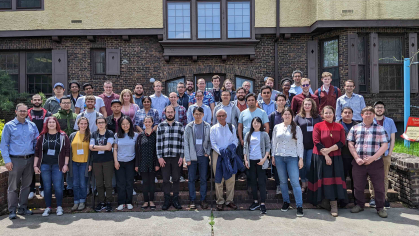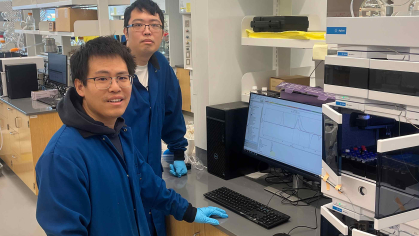Rutgers Researchers Receive Award to Develop First-in-Class Anticancer Therapeutics

Rutgers cancer researchers have been awarded $200,000 to develop drugs that would eliminate cancerous tumors and prevent them for metastasizing.
Raymond B. Birge, New Jersey Medical School (NJMS), William Welsh, Robert Wood Johnson Medical School (RWJMS) and Youyi Peng, Rutgers Cancer Institute of New Jersey, received the funding from Rutgers HealthAdvance™, a funding platform established with a $4 million grant from the National Institutes of Health Research Evaluation and Commercialization Hub (REACH).
The program’s aim is to speed up biomedical discoveries that can be turned into commercially viable diagnostics, devices, therapeutics and tools to improve health and patient care, and train the next generation of innovators.
“The HealthAdvance funds will enable us to optimize the molecular structures and properties of oncology drugs in order to maximize their effectiveness when administered alone or in combination with existing anticancer therapies,” said Welsh, the Norman H. Edelman Professor in Bioinformatics of Pharmacology at RWJMS.
Researchers will use the funds over the next two years to develop oncology drugs that act directly on cancer cells to eliminate the tumor and prevent them from metastasizing by activating the patient’s immune system to attack and destroy cancer cells.
“We anticipate that combinations of new drugs with existing immunotherapies may have efficacy in solid cancers, including triple-negative breast cancer,” said Birge, professor and vice chair for research in the Department of Microbiology, Biochemistry, and Molecular Genetics at NJMS.
Rutgers researchers say that these funds will help advance drug therapy. “The potential of this novel technology to either act as a therapy to activate the immune system or directly block tumor growth is very exciting,” said Peng, senior bioinformatics specialist at Biomedical Informatics Shared Resource at Rutgers Cancer Institute.
The program aims to energize the innovation culture across all university campuses to speed up the translation of biomedical discoveries into commercially viable diagnostics, devices, therapeutics and tools to improve health and patient care, and train the next generation of innovators.
“The technology has already piqued the interest of leading early-stage investors, which is a promising indicator of the probability of success, which is our goal as a research commercialization team,” said Yair Harel, executive director of New Ventures and Commercialization Funding in the Office of Research and Economic Development.


